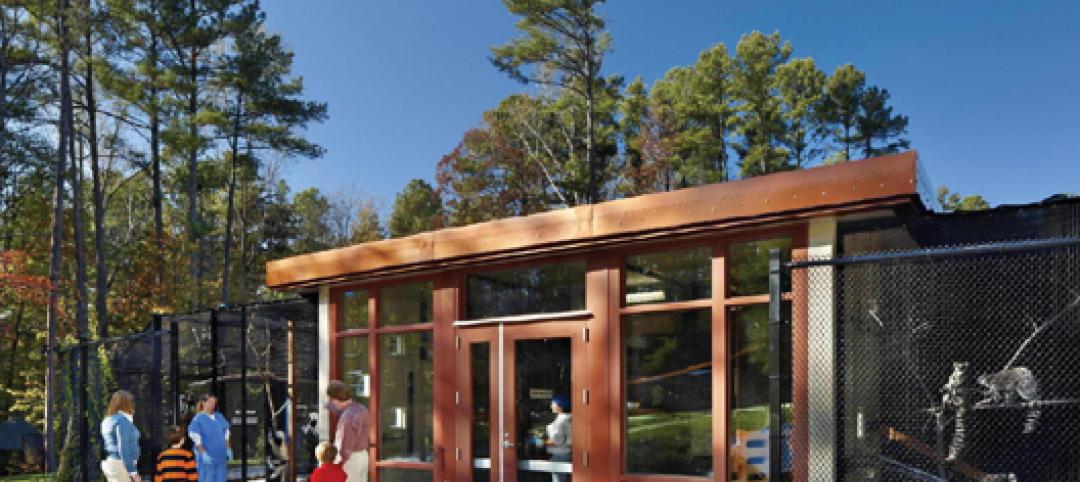Last Friday, Spiezle Architectural Group, a 63-year-old design and planning firm, held a ribbon-cutting ceremony for its new 15,000-sf office in Hamilton in central New Jersey.
Spiezle had recently relocated to its new headquarters from a former bank building in nearby Trenton, N.J., where the company had operated for over 25 years. Spiezle executives spent over a year looking for the right space, and its move included filling four 30-yard dumpsters with stuff that would not be traveling with Spiezle to its new home.
The headquarters relocation can be seen as the culmination of some big changes at the company over the past few years, including the appointment last November of 14-year company veteran Tom Perrino, AIA, LEED AP, as Spiezle’s President and CEO, after he served as interim CEO for 11 months.
Perrino is also a member of Spiezle’s five-person board of directors, which since March 2015 has been chaired by Anthony “Skip” Cimino, a Partner with the lobbying firm Kaufman Zita Group.
As part of its strategic growth plan, Spiezle last September acquired GS Architects, a Havertown, Pa.-based firm founded in 1999, which is strong in the hospital and interior design sectors. That transaction increased the employee-owned Spiezle’s workforce to 60, and extended its market reach to western Pennsylvania. “We are now servicing clients in Pittsburgh,” says Perrino.
The company considered vertically integrating into engineering, but decided against that at this time. However, it is seeking more landscape design work, after bringing on Adam Alexander, LLA, RLA, as its director of landscape architecture. Alexander, who had previously been with Partner Engineering & Science, has added a staff person and is looking to bring on a second.
Spiezle’s expertise now includes the educational sector (it has 30-plus Higher Ed clients and is a K-12 regional leader), acute healthcare, senior living, government, non-profit, and corporate office buildings.
Tom Perrino (right), Spiezle Architectural Group's President and CEO, with (from left) principals Scott Downie, AIA, LEED AP, and Steve Leone, AIA, LEED AP BD+C. They lead the employee-owned firm with 60 associates. Image: John Caulfield/BD+C
One of the firm’s more prominent assisted living projects, Parker at Monroe (N.J.), is a long-term care community with 96 residents, consisting of six “small homes” of 16 residents each, which are connected to a community center. Two small homes cater to residents with early to mid-stage dementias, three for residents with mid- to late-stage dementias, and one small home for people who are cognitively well but live with physical challenges.
Perrino says his firm generally prefers to avoid “fee-based” projects, and relies more on business from repeat customers. “We’re not a ‘one-and-done’ firm,” he says.
The company is involved in about 100 projects in various stages, more than 60 as AOR. Its recent commissions include the design for a new emergency services training center in Huntingdon County, N.J.; and a health sciences building at Neumann University in Aston, Pa. Voters in Hazlet, N.J., recently approved a $43 million bond for renovations at eight schools, for which Spiezle will be performing the design. The firm is also designing a $50 million science building at New Jersey City University scheduled for completion next year.
The company’s new headquarters, with its open-concept interior design that bathes the workspace with natural light, seeks to foster collaboration. Perrino says that Spiezle’s goal is “sustained growth,” not only for the company but also for its employees: it recently added “associate principal” to its organizational chart, as a way for its employee-owners to move up the ladder.
Related Stories
| Jan 25, 2011
Bloomberg launches NYC Urban Tech Innovation Center
To promote the development and commercialization of green building technologies in New York City, Mayor Michael R. Bloomberg has launched the NYC Urban Technology Innovation Center. This initiative will connect academic institutions conducting underlying research, companies creating the associated products, and building owners who will use those technologies.
| Jan 25, 2011
Top 10 rules of green project finance
Since the bottom fell out of the economy, finding investors and financial institutions willing to fund building projects—sustainable or otherwise—has been close to impossible. Real estate finance prognosticators, however, indicate that 2011 will be a year to buy back into the real estate market.
| Jan 25, 2011
Chicago invented the skyscraper; can it pioneer sustainable-energy strategies as well?
Chicago’s skyline has always been a source of pride. And while few new buildings are currently going up, building owners have developed a plan to capitalize on the latest advances: Smart-grid technologies that will convert the city’s iconic skyline into what backers call a “virtual green generator” by retrofitting high-rise buildings and the existing electrical grid to a new hyper-connected intelligent-communications backbone.
| Jan 25, 2011
AIA reports: Hotels, retail to lead U.S. construction recovery
U.S. nonresidential construction activity will decline this year but recover in 2012, led by hotel and retail sectors, according to a twice-yearly forecast by the American Institute of Architects. Overall nonresidential construction spending is expected to fall by 2% this year before rising by 5% in 2012, adjusted for inflation. The projected decline marks a deteriorating outlook compared to the prior survey in July 2010, when a 2011 recovery was expected.
| Jan 25, 2011
Jester Jones Schifer Architects, Ltd. Joins GPD Group
GPD Group is excited to announce that Jester Jones Schifer Architects, a Marion-based architectural firm, has joined our firm, now enabling GPD Group to provide architectural services to the Central-Ohio market.
| Jan 21, 2011
Combination credit union and USO center earns LEED Silver
After the Army announced plans to expand Fort Bliss, in Texas, by up to 30,000 troops, FirstLight Federal Credit Union contracted NewGround (as CM) to build a new 16,000-sf facility, allocating 6,000 sf for a USO center with an Internet café, gaming stations, and theater.
| Jan 21, 2011
Manufacturing plant transformed into LEED Platinum Clif Bar headquarters
Clif Bar & Co.’s new 115,000-sf headquarters in Emeryville, Calif., is one of the first buildings in the state to meet the 2008 California Building Energy Efficiency Standards. The structure has the largest smart solar array in North America, which will provide nearly all of its electrical energy needs.
| Jan 21, 2011
Primate research facility at Duke improves life for lemurs
Dozens of lemurs have new homes in two new facilities at the Duke Lemur Center in Raleigh, N.C. The Releasable Building connects to a 69-acre fenced forest for free-ranging lemurs, while the Semi-Releasable Building is for lemurs with limited-range privileges.
| Jan 21, 2011
Harlem facility combines social services with retail, office space
Harlem is one of the first neighborhoods in New York City to combine retail with assisted living. The six-story, 50,000-sf building provides assisted living for residents with disabilities and a nonprofit group offering services to minority groups, plus retail and office space.












